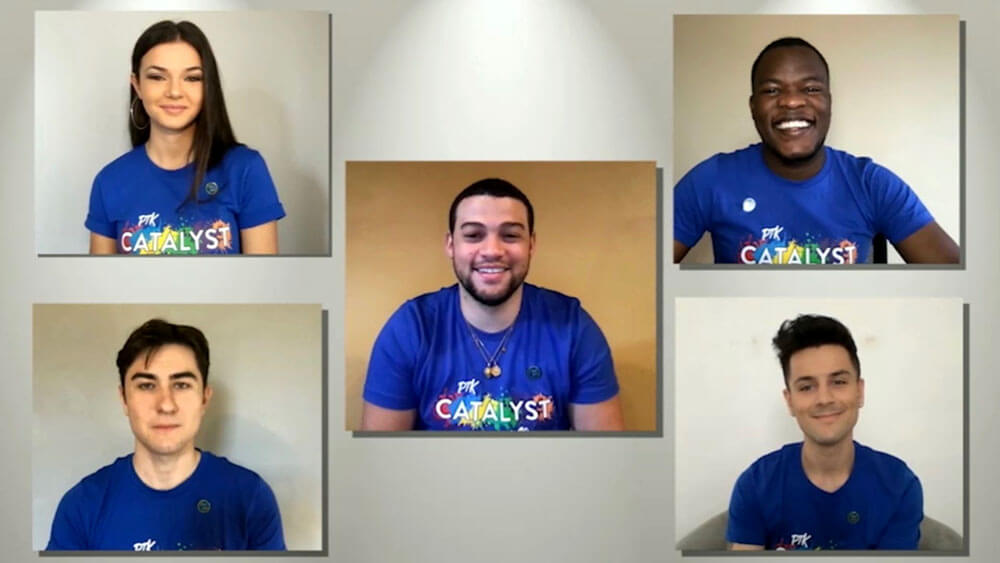
One of Phi Theta Kappa’s primary goals is to provide leadership opportunities for student members, so retaining student participation — which included hearing from the 2019-20 international student officers — was a priority for its virtual event.
When it became clear that Phi Theta Kappa Honor Society (PTK), the official honor society for two-year colleges, couldn’t safely hold its 2020 annual convention as planned — in person in Dallas in April — canceling it didn’t seem like the best course for the organization.
The annual convention, which typically has taken place over three days and draws approximately 3,500 college students, faculty, and administrators, “is tied to nearly everything we do as an organization throughout the year,” said Lynn Tincher-Ladner, Ph.D., Phi Theta Kappa’s president and CEO. “We were determined to host the event in some form.”
But what format? In creating PTK Catalyst 2020, held April 16-17, as a virtual event, staff were guided by three questions, said Erin Cogswell, PTK’s public relations and content coordinator:
1. How do we translate content to a virtual platform?
“Evaluating your content is imperative,” Cogswell said. Audience attention spans are shorter, and content is experienced much differently. As PTK converted its three-day conference to a two-day virtual event, it concentrated on the content most important to participants and sponsors, she said. “We made tough decisions to condense 10 hours of ballroom content down to just three or four hours.” Phi Theta Kappa’s primary goals are to provide scholarships and leadership opportunities for student members, so retaining student participation and recognition were priorities.
So proud of these five amazing people!!! 2020-2021 International Officer Team! @PHITHETAKAPPA #PTKCatalyst pic.twitter.com/HCqPNT8xkv
— hadley 🦋 (@hadleystrainge) April 18, 2020
2. What kind of outside technical support do we need?
PTK, which is based in Jackson, Mississippi, hired Orlando-based TEK Productions to produce the event. PTK had some experience with digital, as they previously had livestreamed portions of the in-person meeting. “At a very basic level, you can record a video and post it for others to watch,” said Wendy Giammarco, PTK’s vice president of events and marketing. “But if you want to maintain a certain level of quality — and make it worth the registration cost — you’ll want to invest in the right technology and a good production team.”
TEK tailored its services to the conference participants’ needs, including helping prepare student officers to make digital presentations. To make sure they all had the right equipment, TEK shipped laptops to each of the organization’s five presiding officers and then spent a day coaching them through their presentations. Those segments were edited together with talks from keynote speakers and 38 officer candidate speeches.
The production company also helped PTK pull off a complex real-time election, held over multiple time zones — the organization’s voting structure required that the audience vote for officers during set times and that the officer election announcement be ready for live playback within 90 minutes of final voting. “Registrants received a link and a passcode, and the sessions were live-streamed during set times,” Giammarco said. “We kept the viewing times as short as possible and held the sessions when we felt the most people — across all time zones — would be able to watch.”
3. How can you keep your audience engaged?
“When you shift to someone’s laptop in their living room, you’re competing with a number of distractions and you’ve lost the collective energy of in-person attendance,” said Kari Hyatt, vice president and executive producer at TEK. Some of the things that PTK did to promote engagement included sending every registrant who ordered a t-shirt a free convention pin and asking people to use an event hashtag “to share pictures or videos of how they’re watching, who they’re with, even what they’re wearing,” Cogswell said.
But online engagement didn’t begin or end with the event, Tincher-Ladner said. The experience of translating the content into an online platform “has already changed the way that we work,” she said. The organization has increased the opportunities for digital engagement with members, including through social media and webinars, particularly on the student chapter level, she said.
PTK created new pricing for the virtual conference, cutting the registration fees it charged for the in-person event from $350 to $250. In order to arrive at that registration figure, PTK subtracted in-person
costs, including food and beverage, and added the costs of technology and production. Those who had already registered for the in-person event were refunded the difference. “We are a nonprofit,” Giammarco said, “so our only [revenue] goal with our convention is to break even — which we did.”
The digital conference looked “virtually nothing like what we would have done in a ballroom,” Cogswell said. But the event, with 4,291 registered attendees, increased attendance by 23 percent compared with previous years. “We believe the actual number of viewers was higher,” Giammarco said, “as we know many chapters held watch parties.”
There were additional benefits: Student members with disabilities told PTK that they were only able to participate in the convention because it had been held online. That has convinced the organization to include virtual options going forward, Tincher-Ladner said. “As we plan our 2021 annual convention, we are creating a virtual budget as well as an in-person budget, so we can best determine how to cover our expenses in each scenario.”
Barbara Palmer is deputy editor at Convene.
I’m ready to start my second session with Catalyst @PHITHETAKAPPA #ptkcatalyst pic.twitter.com/gTyYla2erj
— [email protected] (@vnlundygmailco1) April 17, 2020
Virtual PTK Catalyst Virtually! Great job by @PHITHETAKAPPA for putting this on for the members during these challenging times!! Respect! #ptkcatalyst #ptkcatalyst2020 #miami #VR pic.twitter.com/WmAkcr2h6F
— Charles Ace (@TheAceCharles) April 16, 2020
